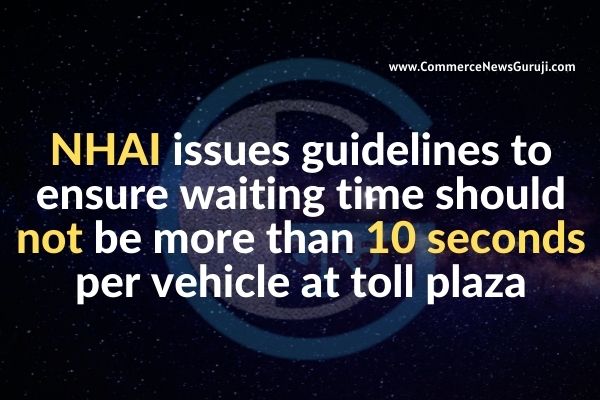In order to ensure smooth and quick passage of vehicles at the toll plazas, National Highways Authority of India (NHAI) has issued guidelines to ensure service time of not more than 10 seconds per vehicle even during peak hours at the toll plazas on the National Highways.
The new guidelines will also ensure seamless flow of traffic at the toll plazas by not allowing vehicles to queue up more than 100 metres. Although at most of the toll plazas, there is no waiting time after mandatory 100% Fastag, even then if there is queue of waiting vehicles of more than 100 metres due to some reason, the vehicles will be allowed to pass without paying toll till the queue comes within 100 metres from the toll booth. For this purpose, a yellow line at a distance of 100 metres from toll booth will be marked in each toll lane. This is to inculcate further sense of accountability in toll plaza operators.
Since NHAI has successfully transitioned to 100% cashless tolling from middle of February 2021, the overall FASTag penetration at NHAI Toll Plazas has reached 96% and stands at 99% at many toll plazas. Keeping in view the growing Electronic Toll Collection (ETC) penetration in the country, it has been emphasized to have a new design and construct the upcoming toll plazas as per traffic projections for next 10 years to have an efficient toll collection system.
As social distancing has become the new normal, more and more commuters are opting to use FASTag as it removes the chances of any direct contact between the drivers and toll operators. The constant growth and adoption of FASTag by the highway users is encouraging and has helped bringing more efficiency in toll operations.
(Also read: Recommendations made during 43rd meeting of the GST Council)
(Also read: Launch of 1st phase of MCA21 Version 3.0)
(Also read: CBDT extends certain due dates for FY 2020-21 in light of severe pandemic)
(Also read: CBDT extends last date for mandatory updating of UDINs in all Income Tax Forms)
(Also read: Clarification regarding gap between two board meetings under section 173 of the Companies Act, 2013)
(Also read: Clarification by MCA regarding spending of CSR funds for various COVID19 activities)
Disclaimer: The above post includes some content used from PIB India website and executed on this website for fair use only. As this website is of educational nature, hence the content is used for education and awareness to the public.

